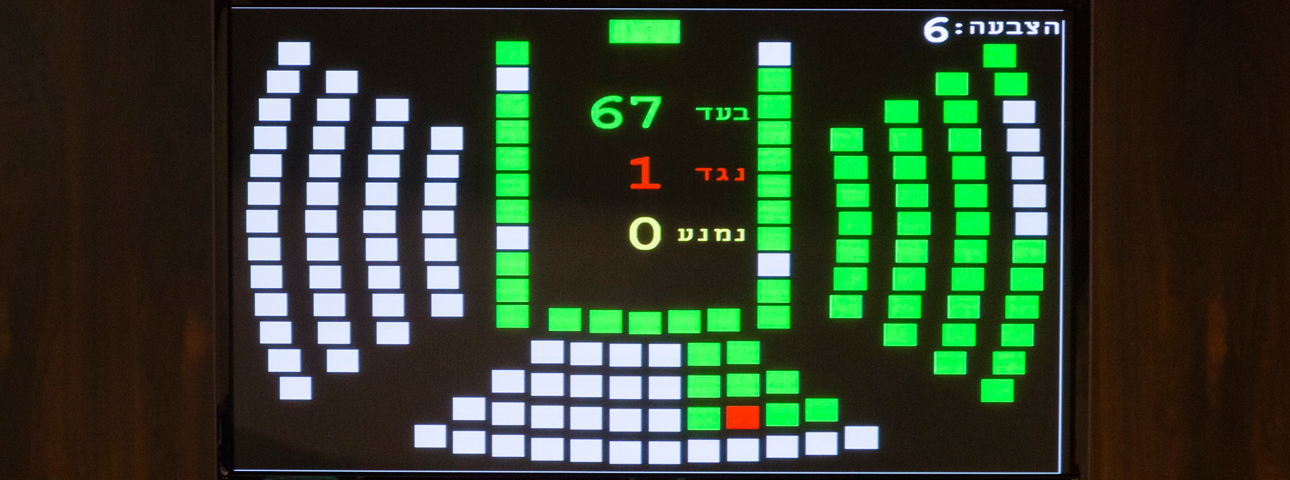A Decade of Anti-Democratic Legislation

Flash 90
The last decade in Israel has been marked by a wave of legislation that has dealt a blow to the country’s democratic values, the rule of law, and separation of powers. Several significant laws were passed as early as 2011. These included the Admissions Committees Law, allowing small settlements to maintain admissions committees to vet potential residents, in order to keep out Arabs and other “undesirables,” thus infringing on their right to equality; and the Anti-Boycott Law, to prevent calling for boycotts of businesses or public institutions over the Green Line, thus infringing on the right to freedom of expression. Another law passed in 2011, was the Nakba Law, which enables the Minister of Finance to withdraw funding from institutions commemorating the Nakba (the Arabic term for the Palestinians’ catastrophic defeat in the 1948 war), support terror, or hold events counter to Israel’s character as a Jewish state—though it should be noted that since this law was passed, it has remained almost entirely unimplemented in practice.
This stream of legislation also brought with it dozens of additional bills, none of which were passed, but which paved the way for other laws that came later: These included bills which would make citizenship and the receipt of official documents contingent on a “declaration of loyalty” to the state as a "Jewish and democratic state"; bills designed to restrict the freedom of expression and the activity of civil society organizations; and bills seeking to limit the power of the Supreme Court, to change the processes for appointing justices, and to constrain the authority of the Attorney General. This wave of bills has been unrelenting since 2011, but reached a peak between 2015 and 2019, when many laws inflicting substantial damage on democratic values in Israel, were passed. Among others, these included a law allowing Knesset members to remove from office (albeit with a large majority of 90 out of 120) any Knesset member, thus bestowing upon the Knesset, the right to prosecute, judge, and execute –with regard to criminal felonies. Similarly, a “softer” version was passed of a law designed to discredit NGOs receiving support from foreign governments, as well as a law giving the Minister of Education the power to curtail the freedom of school principals to invite representatives of NGOs to participate in school events.
The crowning glory of the last decade’s anti-democratic legislation was, in my opinion, the Basic Law: Israel—The Nation-State of the Jewish People, passed in 2018. Though many believe that the law merely “declares” the State of Israel to be the nation-state of the Jewish people, in a similar way to the Declaration of Independence, this is in fact, a misconception. The Declaration of Independence is a worthy and balanced Zionist document, which on the one hand defines Israel as a Jewish state, but at the same time -- also defines it as a state affording equality to all its citizens. While we can debate whether the Basic Law has changed the legal status of non-Jews in Israel or their right to equality, there is no doubt that on a symbolic level, it has been extremely painful to Israel’s minorities—and this should not to be underestimated or treated lightly. As a proxy for a constitution, Israel’s Basic Laws play a critical role in reflecting and promoting national s values; thus the lack of recognition given by the law to the equal status of minorities cries out to the heavens.
However, it should also be noted that most of the bills put forward with the aim of undermining the rule of law (such as the “French law”) and the powers of the courts (such as the override clause and other proposals), as well as those seeking to change the processes for appointing justices – failed – due to opposition from within the governing coalition. Hardly by coincidence, public opinion polls also revealed that they were opposed by a majority of Israeli citizens. Similarly, the results of the most recent elections indicate that the assault on the rule of law and on the courts, has failed to gain significant popularity, even if gaining growing—and very vocal-- support. There have also been last-minute defeats of bills designed to curtail the independence of legal advisors in government ministries, and of a bill which would give the Minister of Culture the power to deny public funding to cultural institutions, based on political considerations.
We can only hope that in the coming decade we will see less –or even a complete halt—of bills such as these, and that Knesset members will find a way to establish the proper balance between the branches of government and to anchor human rights in Basic Laws that are stable and bolstered by a large Knesset majority. In this way, the majority of legislative time and effort in the Knesset could be devoted to solving the everyday challenges facing Israel, rather than to populist legislation seeking to change the rules of the game and to persecute the country’s minorities.
The article was published in the Times of Israel.
